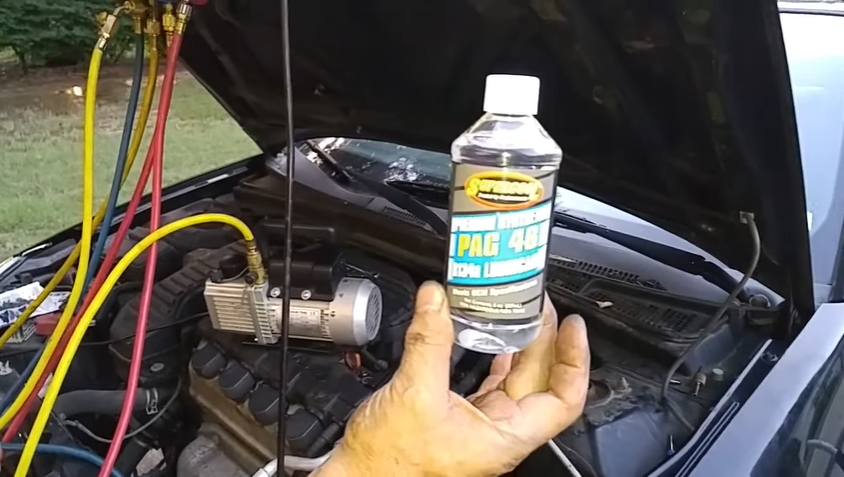Pig oil does not absorb moisture. It is a hydrocarbon-based lubricant that repels water and other fluids.
PAG oil is a type of oil used in lubrication and as a coolant in many industries. It is also known as polyalphaolefin (PAO) oil. Pig oil has many benefits, one of which is its ability to absorb moisture.
This makes it ideal for use in environments where moisture is an issue, such as in food processing or pharmaceutical manufacturing.
Does Oil Absorb Moisture from the Air?
Oil does not absorb moisture from the air. In fact, oil repels water, preventing it from penetrating the surface. This is why oil is used as a waterproofing agent.
What are the Advantages of Pag Oil?
PAG oil (polyalkylene glycol) is a synthetic lubricant used in various applications. PAG oil has several advantages over other oils, including its high viscosity and low pour point. This makes PAG oil ideal for use in high-temperature and high-pressure environments.
Additionally, PAG oil is resistant to degradation by water and oxidation.
Why Should You Always Use Mineral Oil Instead of Paraffin Oil?
If you’re looking for a superior lubricant for your compressor, it’s best to use mineral oil instead of PAG oil. Here’s why: 1. Mineral oil is more resistant to breakdown.
PAG oil breaks down quickly when exposed to heat and moisture, necessitating frequent replacement. Mineral oil, on the other hand, can withstand higher temperatures and humidity without breaking down. This makes it a more reliable lubricant for your compressor.
2. Mineral oil doesn’t foam or emulsify. Foaming and emulsifying are two issues you want to avoid when using a compressor. But both can occur when using PAG oil.
Foaming reduces the efficiency of the compressor by preventing proper lubrication, while emulsifying leads to deposits that can clog up the System. Neither of these problems will occur when using mineral oil. 3.
Mineral oil is less expensive than PAG oil over time. If you’re looking for a cost-effective way to lubricate your compressor, mineral oil is the best..
Which Refrigerant Oil is Hygroscopic?
The most common refrigerant oils are based on mineral oil, but there are also synthetic (artificial) oils available. Some of the newer synthetic oils are more “hygroscopic” than mineral oil, meaning that they absorb moisture from the air more readily. This can be an issue in systems where moisture is abundant, such as in coastal areas or high-humidity environments.
Removing moisture from the oil
If we are retrofitting the system to use R-134a, Which Oil Do We Need to use?
When retrofitting a system to use R-134a, the most important consideration is to ensure that the correct oil is used. There are many oils on the market that are not compatible with R-134a, and using the wrong one can cause serious problems. The best way to ensure that you are using the correct oil is to consult your owner’s manual or contact the manufacturer.
How Long Does PSystem Last
Synthetic oil is a type of lubricant commonly used in automotive applications. It is known for its ability to withstand high temperatures and its resistance to degradation. PAG oil can last for up to five years if properly maintained.
Mineral Oil is Clear to Light Yellow, And Pag Oil is Usually a Light ________ Color.
If you’re wondering what the difference is between mineral oil and paraffin oil, here’s a quick rundown. Mineral oil is clear to light yellow in colour, while paraffin oil is usually a light amber colour.. Both are used as lubricants and hydraulic fluids. Still, pagag oil has a higher viscosity than mineral oil.
That means it’s thicker and takes longer to flow. It also has a higher flash point, meaning it can withstand higher temperatures before breaking down.
Alkylbenzene Ab Oil is Miscible in Hcfc Refrigerant
Alkylbenzene Ab oil is miscible in HCFC refrigerant. This means that it can be mixed with the refrigerant without separating into different layers. The oil provides lubrication and helps to seal the compressor, while the HCFC helps to lubricate the system.
ConclusionSystem
Pag oil is a popular choice for oil-based compressors because it is known to have good moisture absorption properties. But does pag oil actually absorb moisture? The answer may surprise you.
It turns out that pag oil does indeed absorb moisture, but not as much as other oils. In fact, it is only about half as effective at absorbing moisture as other oils. However, this still makes it a good choice for compressors, as it helps prevent moisture buildup and keeps the compressor working properly.




Leave a Reply